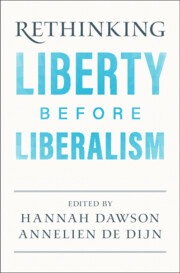Book contents
- Rethinking Liberty before Liberalism
- Rethinking Liberty before Liberalism
- Copyright page
- Dedication
- Contents
- Figures
- Contributors
- Acknowledgements
- Introduction
- Part I Authors
- Part II Hierarchies
- Part III Traditions
- 8 Beyond the ‘Wretched Subterfuge’
- 9 ‘A Just and True Liberty’
- 10 Chains and Invisible Threads
- 11 Neo-Roman Liberty in the Philosophy of Human Rights
- Conclusion
- Bibliography
- Index
8 - Beyond the ‘Wretched Subterfuge’
Liberalism, Freedom, and Responsibility*
from Part III - Traditions
Published online by Cambridge University Press: 22 February 2022
- Rethinking Liberty before Liberalism
- Rethinking Liberty before Liberalism
- Copyright page
- Dedication
- Contents
- Figures
- Contributors
- Acknowledgements
- Introduction
- Part I Authors
- Part II Hierarchies
- Part III Traditions
- 8 Beyond the ‘Wretched Subterfuge’
- 9 ‘A Just and True Liberty’
- 10 Chains and Invisible Threads
- 11 Neo-Roman Liberty in the Philosophy of Human Rights
- Conclusion
- Bibliography
- Index
Summary
In Liberty before Liberalism, Quentin Skinner formulated what has turned out to be one of the most generative distinctions in recent political theory. Late medieval lawyers and Renaissance humanists, he explained, developed a 'neo-Roman' theory of freedom, according to which persons are free only if they are not dependent on the will of another person. It was this theory, for Skinner, that Thomas Hobbes momentously dislodged by redefining freedom as the absence of interference – thus paving the way for the emergence of 'liberalism'. This chapter questions the degree to which the liberal tradition did in fact assimilate the Hobbesian theory of liberty. It suggests that Kantian liberals accepted the neo-Roman account of political liberty, while simultaneously insisting that, in the realm of metaphysics, being one’s own master was insufficient to render a person free. I claim that we can only understand this fact about liberalism if we recognize Kant’s place in the early-modern Pelagian tradition. I also explain why this genealogy proved uniquely problematic for Kant’s most famous twentieth-century disciple, John Rawls.
- Type
- Chapter
- Information
- Rethinking Liberty before Liberalism , pp. 157 - 177Publisher: Cambridge University PressPrint publication year: 2022



